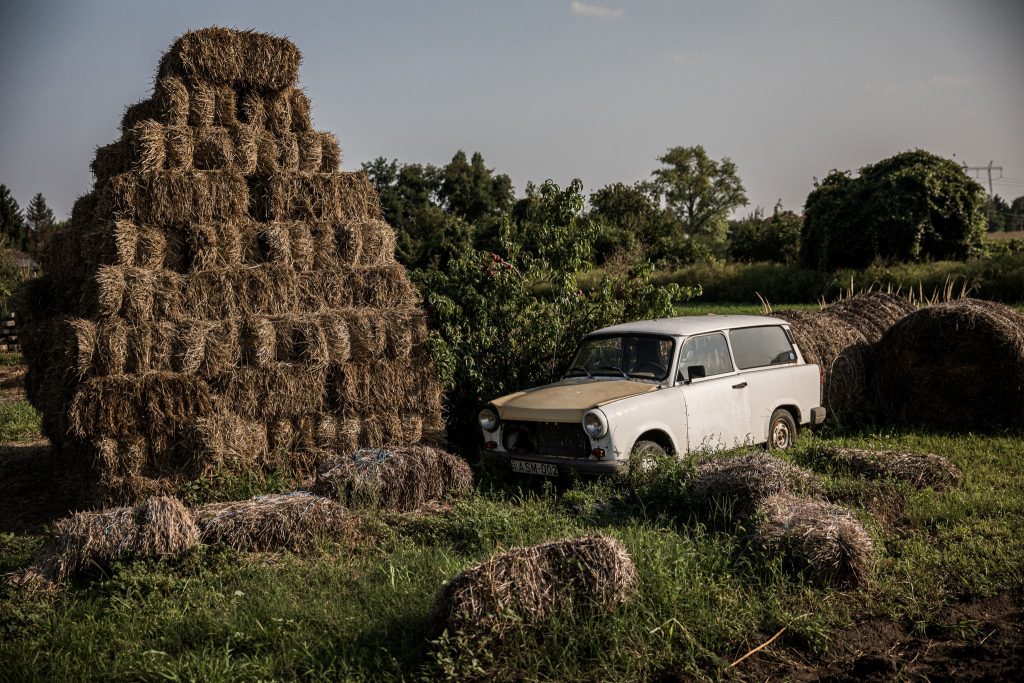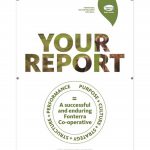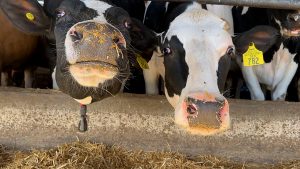
Under Communism, farmers labored in the fields that stretch for miles around this town west of Budapest, reaping wheat and corn for a government that had stolen their land.
Today, their children toil for new overlords, a group of oligarchs and political patrons who have annexed the land through opaque deals with the Hungarian government. They have created a modern twist on a feudal system, giving jobs and aid to the compliant, and punishing the mutinous.
These land barons, as it turns out, are financed and emboldened by the European Union.
Every year, the 28-country bloc pays out $65 billion in farm subsidies intended to support farmers around the Continent and keep rural communities alive. But across Hungary and much of Central and Eastern Europe, the bulk goes to a connected and powerful few. The prime minister of the Czech Republic collected tens of millions of dollars in subsidies just last year. Subsidies have underwritten Mafia-style land grabs in Slovakia and Bulgaria.
Europe’s farm program, a system that was instrumental in forming the European Union, is now being exploited by the same antidemocratic forces that threaten the bloc from within. This is because governments in Central and Eastern Europe, several led by populists, have wide latitude in how the subsidies, funded by taxpayers across Europe, are distributed — even as the entire system is shrouded in secrecy.
A New York Times investigation, conducted in nine countries for much of 2019, uncovered a subsidy system that is deliberately opaque, grossly undermines the European Union’s environmental goals and is warped by corruption and self-dealing.
Europe’s machinery in Brussels enables this rough-hewed corruption because confronting it would mean changing a program that helps hold a precarious union together. European leaders disagree about many things, but they all count on generous subsidies and wide discretion in spending them. Bucking that system to rein in abuses in newer member states would disrupt political and economic fortunes across the Continent.
This is why, with the farm bill up for renewal this year, the focus in Brussels isn’t on rooting out corruption or tightening controls. Instead, lawmakers are moving to give national leaders more authority on how they spend money — over the objections of internal auditors.
The program is the biggest item in the European Union’s central budget, accounting for 40 percent of expenditures. It’s one of the largest subsidy programs in the world.
Yet some lawmakers in Brussels who write and vote on farm policy admit they often have no idea where the money goes.
One place it goes is here in Fejer County, home to Hungary’s populist prime minister, Viktor Orban. An icon to Europe’s far right and a harsh critic of Brussels and European elites, Mr. Orban is happy to accept European Union money. The Times investigation found that he uses European subsidies as a patronage system that enriches his friends and family, protects his political interests and punishes his rivals.
Mr. Orban’s government has auctioned off thousands of acres of state land to his family members and close associates, including one childhood friend who has become one of the richest men in the country, the Times investigation found. Those who control the land, in turn, qualify for millions in subsidies from the European Union.
“It’s an absolutely corrupt system,” said Jozsef Angyan, who once served as Mr. Orban’s under secretary for rural development.
The brazen patronage in Fejer County was not supposed to happen. Since the earliest days of the European Union, farm policy has had outsized importance as an immutable system of public welfare. In the United States, Social Security or Medicare are perhaps the closest equivalents, but neither of them is a sacrosanct provision written into the nation’s founding documents.
The European Union spends three times as much as the United States on farm subsidies each year, but as the system has expanded, accountability has not kept up. National governments publish some information on recipients, but the largest beneficiaries hide behind complex ownership structures. And although farmers are paid, in part, based on their acreage, property data is kept secret, making it harder to track land grabs and corruption. The European Union maintains a master database but, citing the difficulty of downloading the requested information, refused to provide The Times a copy.
In response, the Times compiled its own database that, while incomplete, supplemented publicly available information on subsidy payments. This included corporate and government records; data on land sales and leases; and leaked documents and nonpublic land records received from whistle-blowers and researchers.
The Times confirmed land deals that benefited a select group of political insiders, visited farms in several countries, and used government records to determine subsidy payments received by some of the largest of these beneficiaries. The Times investigation also built on the work done by Hungarian journalists and others who have investigated land abuses despite a media crackdown by Mr. Orban’s government.
WHAT WE FOUND
-How oligarchs, Mafia figures and populists get rich off the European Union
-Farm subsidies helped form the basis for the modern European Union. Today, they help underwrite a sort of modern feudalism in which small farmers are beholden to politically connected land barons.
-The European Union provides $65 billion to farmers each year. It’s the largest line item in the E.U. budget and one of the biggest subsidy programs in the world.
-The centerpiece of the program is that people get paid based on how much land they farm. The system is supposed to help hard-working farmers and stabilize Europe’s food supply.
-But in former Soviet bloc countries, where the government owned lots of farmland, leaders like Hungary’s prime minister, Viktor Orban, have auctioned off land to political allies and family members. And the subsidies follow the land.
-A company formed by the Czech prime minister, Andrej Babis, collected at least $42 million in subsidies last year.
Even as the European Union champions the subsidy program as an essential safety net for hardworking farmers, studies have repeatedly shown that 80 percent of the money goes to the biggest 20 percent of recipients. And some of those at the top have used that money to amass political power.
In the Czech Republic, the highest-profile subsidy recipient is Andrej Babis, the billionaire agriculturalist who is also the prime minister. The Times analysis found his companies in the Czech Republic collected at least $42 million in agricultural subsidies last year. Mr. Babis, who denied any wrongdoing, is the subject of two conflict-of-interest audits this year. The Czech government has, in recent years, ushered in rules that make it easier for big companies — his is the biggest — to receive more subsidies.
“The European Union is paying so much money to an oligarch who’s also a politician,” said Lukas Wagenknecht, a Czech senator and economist who used to work for Mr. Babis. “And what’s the result? You have the most powerful politician in the Czech Republic, and he’s completely supported by the European Union.”
In Bulgaria, the subsidies have become welfare for the farming elite. The Bulgarian Academy of Science has found that 75 percent of the main type of European agricultural subsidy in the country ends up in the hands of about 100 entities. This spring, the authorities carried out raids across the country that exposed corrupt ties between government officials and agricultural businessmen. One of the largest flour producers in the country was charged with fraud in connection with the subsidies and is awaiting trial.
In Slovakia, the top prosecutor has acknowledged the existence of an “agricultural Mafia.” Small farmers have reported being beaten and extorted for land that is valuable for the subsidies it receives. A journalist, Jan Kuciak, was murdered last year while investigating Italian mobsters who had infiltrated the farm industry, profited from subsidies and built relationships with powerful politicians.
Despite this, proposed reforms are often watered down or brushed aside in Brussels and many other European capitals.
European Union officials dismissed a 2015 report that recommended tightening farm-subsidy rules as a safeguard against Central and Eastern European land grabbing. The European Parliament rejected a bill that would have banned politicians from benefiting from the subsidies they administer. And top officials swat away suggestions of fraud.
“We have an almost watertight system,” Rudolf Mögele, one of Europe’s top agricultural officials, said in an interview earlier this year.
Unstated is that, while audits can catch incidents of outright fraud, rooting out self-dealing and legalized corruption is far more difficult. The European Union seldom interferes with national affairs, giving deference to elected leaders.
Few leaders have attempted such widespread, brazen exploitation of the subsidy system as Mr. Orban in Hungary. At rallies, he deploys a false narrative that Brussels wants to strip away farm aid and use it to bring in migrants, and that he alone can stop it.
Farmers who criticize the government or the patronage system say they have been denied grants or faced surprise audits and unusual environmental inspections, in what amounts to a sophisticated intimidation campaign that harkens to the Communist era.
“It’s not like when a car comes for you at night and takes you away,” said Istvan Teichel, who farms a small plot in Mr. Orban’s home county. “This is deeper.”
One man who did speak up was Mr. Angyan, the former under secretary for rural development. A jowly, gray-haired rural economist with a mischievous smile, Mr. Angyan became an unlikely crusader for small farmers. He served under Mr. Orban, initially thinking him a reformer, only to leave angry and disillusioned. He canvassed the countryside, documenting the government’s dubious land deals and mistreatment of small farmers.
And then he disappeared from public life.
A Thief Economy
To understand how leaders like Viktor Orban exploit Europe’s largest subsidy program requires going back 15 years, to when Hungary was spinning with optimism and change.
In a moment that symbolized Western triumph in the Cold War, the European Union officially absorbed much of the breadbasket of Central and Eastern Europe on May 1, 2004. Hungary, the Czech Republic, Poland and Slovakia — all former Soviet satellites — were among 10 nations that joined the bloc that day (Romania and Bulgaria joined three years later).
Amid the celebrations, Mr. Orban was in political purgatory. He had been the prime minister who helped guide Hungary into the union — only to see voters turn him and his party, Fidesz, out of office in 2002. Now he noticed one of the first protest groups to emerge in the new Hungary: farmers.
Hungarian farmers clogged Budapest’s narrow streets in 2005 for a mass demonstration. They did not oppose European Union membership. Far from it. As new European citizens, they wanted the subsidies they were eligible for under the bloc’s Common Agricultural Policy, or C.A.P., but the payments hadn’t arrived. Hungary’s left-leaning government was too disorganized and unprepared.
From the outset, the European subsidies represented a pot of money scarcely fathomable to farmers accustomed to Communist austerity. The program was designed after the Second World War to boost farming salaries and ramp up food production in countries laid waste by conflict. Over time, it became a critical foundation in creating the borderless economy that would grow into the modern European Union.
European leaders understood that absorbing former Soviet satellites would bring challenges, but never fully grasped the potential for corruption in the subsidy program.
At its heart, the program is defined by a simple proposition: Farmers are mostly paid based on how many acres they harvest. Whoever controls the most land gets the most money.
And Central and Eastern Europe had lots of land, much of it still state-owned, a legacy of the Communist era. European officials worked closely with incoming governments on issues such as meeting food testing standards, or controlling borders, yet only limited attention was paid to the subsidies.
“They thought they would change us,” said Jana Polakova, a Czech agricultural scientist. “They were not prepared for us.”
Mr. Orban showed hints of what was to come even before Hungary joined the bloc. Before he left office in 2002, Mr. Orban sold 12 state-owned farming companies, which became known as the “Dirty Dozen,” to a group of politically connected buyers. Buyers got cut-rate deals and exclusive rights to the land for 50 years, making them eligible for subsidies when Hungary became part of the system two years later.
“This is a crony economy, where friends and political allies get special treatment,” said Gyorgy Rasko, a former Hungarian agriculture minister. “Orban didn’t invent the system. He’s just running it more efficiently.”
Out of office, Mr. Orban watched the farmers’ protests in Budapest and saw the potential political and economic power of subsidies in the countryside. He also was intrigued by the man who negotiated successfully on behalf of the protesters: Jozsef Angyan.
After the fall of Communism, Mr. Angyan made the case that small landholders could keep villages alive through sustainable practices. He founded an environmental program at one of the nation’s most prestigious universities and helped build an organic farm called Kishantos with 1,100 acres of wheat, corn and flowers.
“He wanted to help the local farmers,” said Mr. Teichel, the farmer from Fejer County, who said Mr. Angyan was a rare champion of the small farmer in a countryside where corrupt politicians ran a “thief economy.”
Eight years after losing office, Mr. Orban again ran for prime minister in 2010 and wanted to court the rural vote. Mr. Angyan was now a member of Parliament, and his ties to the farmers gave him political clout in the countryside. Mr. Orban summoned him to his modest home west of Budapest.
It was a chilly February morning and Mr. Angyan had a cold. So Mr. Orban fixed tea over a wood-burning stove and, for two hours, the two men spoke about the future of Hungarian farms.
Mr. Angyan envisioned a government that gave small farmers more political and economic clout. Mr. Orban made it clear that he wanted to implement Mr. Angyan’s ideas and offered to make him under secretary of rural development.
“When Orban speaks, he speaks with such conviction,” Mr. Angyan said. “You believe him. I believed him.”
After a landslide victory, Mr. Orban moved quickly, just not as Mr. Angyan had anticipated.
Mr. Angyan’s proposal called on the government to carve up its massive plots and lease them to small and midsize farmers. But Mr. Orban instead wanted to lease whole swaths of land to a coterie of his allies, a move that Mr. Angyan predicted would make the countryside beholden to Mr. Orban’s party, Fidesz, and its allies.
He also knew that European subsidies would follow the land, widening the gap between rich and poor and making it easier for those at the top to wield power.
“I had absolutely no chance to carry out what I wanted to do,” Mr. Angyan said.
In 2011, Mr. Orban’s new government began leasing out public land. At first, officials said that only local, small-scale farmers would be eligible for leases. But the plots ultimately went to politically connected individuals who, in some cases, had been the sole bidders present at auctions. By 2015, hundreds of thousands of acres of public land were leased out and much of it went to people close to Fidesz, according to records obtained from the government and Mr. Angyan.
New leaseholders paid low rates to the government, even as they became eligible for European subsidies. The deals drew sharp criticism in the local media, yet ordinary farmers stayed quiet, despite being left out.
In one example, a powerful Fidesz lawmaker, Roland Mengyi, inserted himself into the leasing process in Borsod-Abauj Zemplen County, where one of his associates won leases for more than 1,200 acres. Mr. Mengyi is an outsized character, who referred to himself as “Lord Voldemort.” He was later convicted and sentenced to prison in a separate case for corruption related to European subsidies.
Mr. Orban’s sudden change in policy left Mr. Angyan disillusioned, and feeling betrayed. He quit the government in 2012 but remained in Parliament, where he tried to push his vision, even as the government moved in the opposite direction.
At a closed-door meeting in early 2013, Mr. Angyan confronted Mr. Orban in front of the prime minister’s most trusted allies in Parliament.
“You’re going to destroy the countryside!” Mr. Angyan recalled saying.
“You are a well-poisoner,” Mr. Orban shot back, according to Mr. Angyan, startling the crowd with a blunt rebuke of a former member of his cabinet. “You have abandoned me.”
As a shocked silence fell over the party faithful, Mr. Orban launched into a soliloquy comparing politics to a battlefield. Those who are loyal, he said, could count on their brothers in arms for protection.
“But those who aren’t?” the prime minister asked. “We will also fire at them.”
A Modern Feudalism
In 2015, Mr. Orban started moving even faster. His government sold hundreds of thousands of acres of state farmland, much of it to politically connected allies. Technically, it was an auction. But many local farmers say they were told not to bother bidding because winners had been predetermined. Few could afford the large plots, anyway, and many more did not even know about the sales.
One pensioner, Ferenc Horvath, 63, lives in a shack in Fejer County, and belatedly discovered that the government had sold all the state-owned land surrounding his tiny plot.
“It happened so fast,” Mr. Horvath said. “We had no idea you could buy land here.”
On nearly all sides, Mr. Horvath had a new neighbor, Lorinc Meszaros, a childhood friend of Mr. Orban and former pipe-fitter who is now a billionaire. Fences sprung up overnight, and the stench of pig manure fell over the area.
Mr. Meszaros, along with his relatives, has bought more than 3,800 acres in Fejer County alone, according to a Times analysis of land data compiled by Mr. Angyan and other sources, and confirmed by visits to the farm. Mr. Orban’s son-in-law and another friend of the prime minister’s have also bought large estates a short drive away, The Times found.
The prediction made by Mr. Angyan — that Mr. Orban’s policies would make the countryside beholden to Fidesz and his allies — was being realized.
It is a type of modern feudalism, where small farmers live in the shadows of huge, politically powerful interests — and European Union subsidies help finance it. In recent years, according to a Times analysis of Hungarian payment data, the largest private recipients of farm subsidies were companies controlled by Mr. Meszaros and Sandor Csanyi, an influential businessman in Budapest.
Last year alone, companies controlled by the two men received a total of $28 million in subsidies.
The two men have radically different relationships with Mr. Orban and his party.
Mr. Csanyi is seen as someone Mr. Orban cannot afford to antagonize. He is chairman of OTP Bank, one of the nation’s most important financial institutions, and has a reputation for outlasting mercurial leaders. He has hired out-of-work politicians from all parties, and his farming conglomerate, led by his son, now controls two of the “Dirty Dozen” companies privatized by Mr. Orban.
Mr. Meszaros’s fortune, by contrast, is tightly bound to the prime minister. He has built an empire by winning government contracts for projects largely financed by the European Union and has recently snapped up companies that once belonged to a business tycoon who had fallen out of favor with Mr. Orban.
They are eligible for a range of subsidies under the Common Agricultural Policy, whether direct payments based on acreage, subsidies directed at livestock and dairy farming or rural development programs — all of which is distributed at the national level by the Fidesz government.
“I’m always accused, and I am very angry about it, that I got the biggest subsidies,” Mr. Csanyi said in an interview. The reason, he said, is not politics. It is pigs. “I produce about one-sixth of the Hungarian pig production.”
On paper, landowners should face restrictions. The Hungarian government has capped subsidy payments to the biggest farms, a seemingly progressive policy advocated by reformers. But farmers say it is easy to skirt the rule by dividing plots and registering the land to different owners.
Rajmund Fekete, a spokesman for Mr. Orban, said that Hungarian subsidy procedures “fully satisfy” European regulations but declined to answer specific questions about Mr. Angyan, or about land sales that benefited Mr. Orban’s relatives and allies.
“Hungary is also fully compliant in the sale of state land, which is regulated by law,” he said.
In Brussels, European officials were specifically warned about problems in Hungary even before the auctions. A May 2015 report, commissioned by the European Parliament, investigated land grabbing and cited “dubious land deals” in Hungary. The report even cited Mr. Orban’s home of Fejer County.
More broadly, the investigators found that wealthy, politically connected landowners had the power to annex land across Central and Eastern Europe. “This is particularly so when they conspire with government authorities,” the report said.
In Bulgaria, for example, land brokers had pushed for laws allowing them to effectively annex small farms.
Investigators pointed to the farm subsidy program as a major factor, saying it encouraged companies to acquire more and more land.
“The C.A.P. in this sense has clearly failed to live up to its declared objectives,” said the report, which was prepared by the Amsterdam-based Transnational Institute.
In a written response, European agricultural officials denounced the findings as unreliable, and in bold letters declared that it was up to the countries’ leaders to set and enforce national land use policies.
That deference to national governments is a hallmark of the European Union. But it has left the bloc unable or unwilling to confront leaders who try to undermine its efforts, said Tomás García Azcárate, a longtime European agriculture official who now trains the Continent’s policymakers.
“The European Union has very limited instruments for dealing with gangster member states,” he said. “It’s true on policy, on agriculture, on immigration. It’s a real problem.”
As Mr. Orban’s government began auctioning off thousands of acres to his allies, Mr. Angyan began his own project. Out of government, he meticulously studied the land sales, compiling a record that officials could not easily purge. He interviewed farmers who had been abandoned by the government and mapped political connections among the buyers — findings now supported by the Times analysis.
Beyond the biggest oligarchs like Mr. Meszaros, other supporters and sympathizers of Mr. Orban got blocks of public land.
In Csongrad County, for example, family members and associates of Janos Lazar, a Fidesz lawmaker, were among the biggest buyers, obtaining about 1,300 acres. In Bacs-Kiskun County, associates and family members of a former business partner of Mr. Meszaros bought big chunks of land. And in Jasz-Nagykun-Szolnok County, associates and relatives of current and former Orban government officials were among the biggest winners in the land auctions. Many have since leased the plots, with a markup, to big agricultural firms that receive European subsidies.
“This is what the European Union resources do, and the revenues from the land do,” said Mihaly Borbiro, a former mayor of Obarok, a tiny village in Fejer County, a short drive from Mr. Orban’s hometown.
While political patrons get rich, many small farmers count on the subsidies to survive. That discourages them from criticizing the system too loudly, many of the farmers said, especially in the face of retribution.
Ferenc Gal, who raises cows, alfalfa and a few pigs on his family farm, said he applied to lease about 320 acres because the European subsidies alone would have made it profitable before he even planted anything. Local farmers were supposed to get preference, but the land went to wealthy out-of-town investors.
When he complained, he quickly found himself a pariah. He said government inspectors showed up at his farm, suddenly concerned about environmental and water quality. He said local officials told him not to bother applying for future rural grants.
“Once you’re on a black list,” Mr. Gal said, “that’s it.”
A Policy of Fear
Retribution also found Jozsef Angyan.
Months after he quit the cabinet, government officials retracted the lease on Kishantos, the organic farm he had helped operate for 20 years. They gave the land to political loyalists, who plowed over the fields and sprayed the cropland with chemicals.
Then school officials shuttered Mr. Angyan’s department at Szent Istvan University, destroying his legacy.
“Orban understands when to keep people in fear,” Mr. Angyan said.
In interviews in Hungary, some agricultural scientists and economists refused to discuss land ownership or asked to not be identified when discussing their research. Farmers, too, saw what happened to the man who spoke up for them.
“If Angyan can’t do anything, what can I do?” said Mr. Teichel, the family farmer near Mr. Orban’s hometown.
Mr. Orban’s control of the European subsidies helps prevent another rural uprising, Mr. Angyan said. As long as the government administers the grants, nobody can afford to speak up. “If you’re critical of the system,” he said, “you get nothing.”
Besides, he added, there is no real opposition in the countryside. Mr. Angyan’s small farmers’ association forged an alliance with Mr. Orban’s far-right party to get the prime minister re-elected. That relationship has outlasted Mr. Angyan, and those in charge of the farming group now hold powerful government positions.
Mr. Angyan has receded from public life. This year, he met twice with The Times, providing the data he had been compiling.
After the second meeting, Mr. Angyan stopped returning phone calls.
When Mr. Teichel saw him recently at a funeral, he looked defeated. “He’s given up the fight,” Mr. Teichel said. As usual, Mr. Angyan asked how the farmer and his family were doing.
“I don’t matter,” Mr. Teichel replied. “I’m just a soldier. How are you doing? You are the general.”
Mr. Angyan replied: “How should I continue when nobody is behind me?”
Reporting was contributed by Agustin Armendariz in London, Hana de Goeij in Prague, Milan Schreuer in Brussels, Akos Stiller in Budapest and Boryana Dzhambazova in Sofia, Bulgaria.























